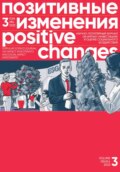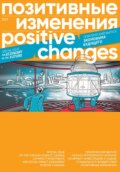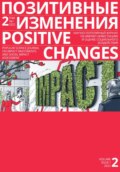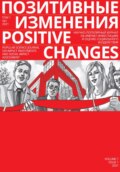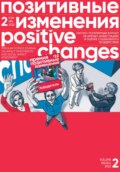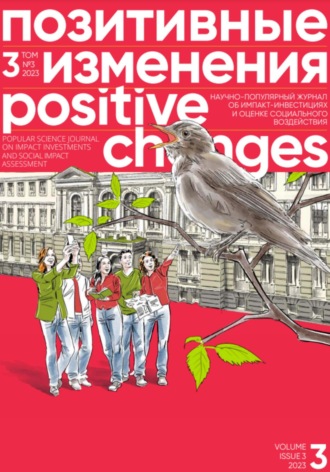
Редакция журнала «Позитивные изменения»
Позитивные изменения. Том 3, № 3 (2023). Positive changes. Volume 3, Issue 3 (2023)
Transformative, Interdisciplinary, and “Without Walls.” A Review of the European University Association’s Vision for 2030
Ksenia Bessonova
DOI 10.55140/2782–5817–2023–3–3–98–106

“True to the Book” is the column where this journal’s editorial team introduces our readers to the latest publications on the topics of impact investing, social impact assessment, and the future of the humanity in general. The work presented in today’s issue is based on the education development strategy proposed by the European University Association. Fittingly called “Universities Without Walls,” the strategy presents a vision of the higher education system in the period between today and 2030. Let’s take a look into the future. What will universities be like, seven years from now? Continue reading to learn the key theses of the publication.

Ksenia Bessonova
Expert, Gladway Foundation for the Development of Media Projects and Social Programs
AN OVERVIEW OF THE VISION AND HOW IT CAME TO BE
The European university development strategy “Universities without Walls”[159] was published in February 2021 by the European University Association (EUA). It is a product of painstaking work by more than 100 experts from within the Association membership, 33 national rectors’ conferences, and a wide range of external consultants and non-university stakeholders.
What are the prerequisites for the creation of the strategy and objectives it is trying to address? In the foreword to the document, Michael Murphy, EUA President, and Amanda Crowfoot, EUA Secretary General, speak about being at a tipping point, driven by multiple economic, political and environmental pressures that add to the urgency of addressing what the future for our societies and our planet should be. “There is a need for a clear vision for and by universities, how they want to develop, shape and respond to these challenges over this decade. While this guide is aimed at providing inspiration and support for Europe’s universities, it is also an invitation to partners from other parts of society to join forces for a better future and for policy makers to ensure the right framework conditions,” they say, addressing the readers.
CHALLENGES AND TRENDS
According to the document, Europe’s universities are keen to live up to the challenges of the times. The Covid-19 pandemic and ensuing economic and social crisis will cast a shadow over the coming years but will also present opportunities for innovation in educational institutions. The authors list ecological, economic and social concerns, the digital transition and major political developments as some of the main drivers of change the universities will face in the new decade. Finding a sustainable equilibrium is the key to all universities.
While the situations and profiles of universities across Europe vary and are very much shaped by their specific local, regional and national contexts, some overall external trends can be observed:
• The climate crisis has led many universities to put their missions into the service of achieving the United Nations Sustainable Development Goals.
• Technological developments are changing lives and disrupting labor markets. Producing knowledge for new technologies and social innovation is a central element of the universities’ activities. However, they also have to ensure that the impact of new technologies on our societies is studied and evaluated and that graduates are equipped for labor markets that are changing due to digitalization and the development of artificial intelligence.
While this guide is aimed at providing inspiration and support for Europe’s universities, it is also an invitation to partners to join forces for a better future and for policy makers to ensure the right framework conditions.
• Democracy and political systems are under pressure in all European countries to different degrees. This also threatens academic freedom and university autonomy.
• The spread of false information, fabricated evidence and the concept of “alternative truth” undermine the value and the role of science in society. Universities need to position themselves on this issue and find new and more effective ways to help counter this trend.
• Research, innovation and education are an increasingly important factor in geopolitics. Europe’s universities must share and co-create knowledge on a global scale.
• In many European countries higher education continues to be a major motor for socioeconomic mobility.
• Many universities face a continuous underfunding challenge. This leads to an uneven playing field and to increased competition between universities for resources.
UNIVERSITIES OF THE FUTURE: WHAT ARE THEY?
Universities in 2030 are “universities without walls,” open and engaged in society while retaining their core values. They are responsible, autonomous and free, with different institutional profiles, but united in their missions of learning and teaching, research, innovation and culture in service to society.
The authors of the strategy believe that universities will build on their capacity to evolve and will become engines of societal change. They will provide an open, transformative space for common knowledge production through research, education, innovation and culture. Together with other societal stakeholders, they will shape the future of a knowledge-driven society. Below we will take a closer look at the characteristics of the universities of the future, as outlined in the strategy.
OPEN, TRANSFORMATIVE AND TRANSNATIONAL
The strategy emphasizes that universities, as communities of learners, academics and professional staff, including alumni and a wide range of partners and citizens, will continue to build bridges between countries, cultures and sectors.
The authors of the document emphasize that universities are the places for testing new ideas, for lateral thinking and for creating new knowledge that still lies outside of mainstream awareness. The European University Association points out that universities can benefit from a dialog with society, actively involving citizens, businesses, non-governmental organizations, public authorities and others.
“Universities will be open as physical and virtual spaces and will work to cultivate both of these when engaging with society. The physical campus will continue to be crucial as a place for social interaction, meetings, dialogs, focused learning and research. The virtual campus will make the university ubiquitous. It will be developed to improve access for all to participate in research and learning, enhance cooperation, and explore new, innovative ways of pursuing university missions,” the document states.
The Association believes that the future of Europe’s universities will be transnational, continuing to provide a prerequisite for high quality research and innovation, as well as learning and teaching.
SUSTAINABLE, DIVERSE AND ENGAGED
According to the authors of the vision, universities will put their missions into the service of sustainability. This will require a careful balance between funding of strategic research priorities, retaining the freedom of the individual researchers and recognizing the responsibility of universities in ensuring a broad knowledge base for society.
Interdisciplinarity is an important approach in the universities’ activities. Many new discoveries will happen at the interface between disciplines and will be crucial for meeting the challenges.
Diversity and social cohesion are important components of sustainable development. Access to higher education will be equitable and open to all. Universities will be equipped to welcome students and staff from all backgrounds, playing an important role in addressing social disparities.
“Learning and research environments will be designed to accommodate the needs of a diverse student and staff body. Universities will keep working in partnerships in order to connect, share and build capacity. They will form an inclusive, truly global research and higher education community with partners all around the world,” the vision proclaims.
STRONG, AUTONOMOUS AND ACCOUNTABLE
The EUA believes that in 2030, universities across Europe will enjoy high levels of autonomy and have the capacity to make strategic choices about organizational, financial, staffing and academic matters. The university community, including all types of learners and staff, will co-create the future of the university together with the institutional leadership.
Universities will be accountable to stakeholders and society at large. There will be a continuous exchange with policy makers, civil society, citizens, business and other societal groups, through various university activities. Stakeholders will support such a dialogue.
The strategy endorses the idea of academic freedom, which is the freedom of thought and inquiry to advance knowledge based on accepted standards of academic ethics and integrity. Universities will ensure that all staff groups have access to continuous training for professional development.
UNIVERSITY MISSIONS IN 2030
According to the strategy, the unique combination of the missions of learning and teaching, research, innovation and culture will remain the key characteristic of Europe’s universities. Let’s go into more detail on what the European University Association puts into the content of each mission.
LEARNING AND TEACHING
“The higher education will nurture and enable the development of learners as creative and critical thinkers, problem solvers and active and responsible citizens equipped for lifelong learning,” the strategy emphasizes.
The authors argue that through higher education, learners will also attain high-level skills and expertise for their professional development. They will have more opportunities to participate in traineeship programs during their studies. Learners will graduate with both knowledge in their disciplines and exposure to challenges and problem-solving, including in other disciplines. This experience will be applied towards positively impacting the society around them.
University learning will be a collegial and collaborative process, in which teaching will be a core part of academic practice, closely linked to research activities.
Universities will provide a context for learning through the integration of their different missions and they will actively promote lifelong learning. While digitalization will continue to expand, physical presence on campus will remain a core feature at most institutions.
While some learners will seek personal development and a degree after finishing secondary education, others will enter at different stages in their lives, with full access to a variety of learning spaces and flexible, multi- and interdisciplinary paths.
RESEARCH
“Universities will be essential to the research process, providing space for lateral thinkers, who test and develop new ideas that are not yet acknowledged by fellow researchers or by society at large. They will promote multi- and interdisciplinary research,” the document continues.
The EUA states that Europe’s scholarly information infrastructure will facilitate cross-border, multidisciplinary research with advanced digital services and tools.
Ethics and integrity will be actively promoted by universities across all missions. Furthermore, universities will maintain the responsibility of delivering doctoral education and ensuring the formation of the next generation of highly qualified researchers.
INNOVATION
Europe’s universities will make human-centered innovation their trademark, aiming to achieve sustainability through cooperative models.
They will engage in co-creation of solutions to common challenges with a wide range of partners spanning from academia, business and start-ups, to civil society and the social and cultural scene.
“Academic research and education will be a key foundation for innovation. Academics and students will be active contributors to innovation by working on concrete challenges in multi- and interdisciplinary teams,” the authors reckon.
CULTURE
According to the EUA, cultural activities will remain a key element in universities’ engagement with society. Universities will be critical custodians of knowledge and traditions. They will continue to protect heritage, promoting the study and knowledge of culture and language diversity within Europe and beyond. They will continue to be places where people from different cultural backgrounds meet, exchange and collaborate. Universities will foster the development of intercultural competences, a vital contribution in a world where local and global realities converge through the increased use of digital technologies.
TURNING VISION INTO REALITY
“Universities need academic freedom, institutional autonomy, sufficient and sustainable funding and efficient support for collaboration. To face the challenges of this decade, it is critical that Europe’s universities are equipped to make decisions about the paths they want to pursue in order to best fulfil their missions in service to society,” the authors state.
According to the document, making this vision a reality will depend on three factors:
1. Enabling frameworks that strengthen and protect university autonomy in its various dimensions. These include supporting universities in their continuous development and including clear and consistent provisions guaranteeing scholars and students the rights that constitute academic freedom. The frameworks need to consider the needs of science, for example in copyright and data protection regulation, and support transnational collaboration among Europe’s universities.
2. Adequate investments in order to meet the challenges of the new decade. Financial autonomy must be strengthened to enable the university to take strategic decisions and foster institutional profiling. Additional investments in infrastructure, both physical and digital, as well as in academic and professional staff, will be crucial.
3. Strong leadership that needs to be inclusive and transparent in its decisionmaking. Current and future leaders must have support for the development of their leadership skills. The strategy also emphasizes the importance of professionalization of staff in all areas of university management.
PRIORITIES FOR ACTION
Reaching out to society at large and opening up for co-creation will be a continuous ambition for universities in this decade.
To fully realize this vision of universities without walls, a coordinated approach and ownership among the main stakeholders are needed. These include university leadership, students and staff, funders and policy makers. The EUA suggests three priority areas of work, i.e., steps that can be taken today to bring the future closer: reform academic careers, promote interdisciplinarity, and strengthen civic engagement.
REFORM ACADEMIC CAREERS
The reform should be acknowledged and supported by all stakeholders through the following actions:
• Using a broader set of evaluation practices for academic careers, which include a wide definition of impact, beyond traditional bibliometric indicators;
• Promoting further parity of esteem between different career paths, including parity of esteem between research and teaching;
• enabling and valorizing Open Science[160] in career and research assessment;
• incentivizing activities with different forms of impact, including innovation or citizen science;[161]
• making academic careers less precarious and more attractive as life choices in order to develop and retain talent;
• providing more flexibility for academic careers, for switching jobs more easily between academia and other sectors, such as start-ups, industry or public administration. Researchers with job experience outside academia must have access to university careers.
PROMOTE INTERDISCIPLINARITY
Interdisciplinary approaches must be better used for meeting societal challenges across university missions. While disciplines must remain important in order to organize and expand the knowledge production at universities, interdisciplinary approaches must be promoted by:
• recognizing interdisciplinary engagement in academic assessment and reward schemes;
• implementing institutional accreditation[162] to complement discipline-based program accreditation;
• making interdisciplinary teaching part of the professional development of academic staff and supporting academic staff from different disciplines in working together.
STRENGTHEN CIVIC ENGAGEMENT
Universities must support civic values. They can do this by:
• supporting the members of the academic community in using their academic freedom to contribute to public debates, encouraging open and evidence-based discussions, countering misinformation and falsehoods and explaining the lack of finality in scientific judgements (that is, the concept that any scientific judgement can be modified or canceled – ed. note);
• promoting opportunities for learners to actively engage in societal projects and debates that build bridges and foster understanding throughout society;
• promoting civic engagement across the university missions, developing participation, respect for diversity and open debate as a common value across the institution;
• providing a continuous reflection on European identity and culture, as well as their contribution to a global world.
Like every institution, universities need a strategy, to visualize what they aspire to be, to see their overarching goals and the steps they need to take in order to get there. “Universities without Walls” is offered as a support, to give university leaders and their academic communities an insight on how universities can develop, respond to challenges and build a society of knowledge in the coming years. Today’s universities are expected not only to address educational and scientific challenges, but also to participate actively and responsibly in society. This need for engagement is understood all across the world. This means that a strong, autonomous university actively working with society is the future we should strive for, and which we should join our efforts for.
Новая жизнь издательского проекта «Каталог «Социальное предпринимательство России»
«Журнал в журнале» – так можно назвать этот блок материалов. Он является продолжением каталога «Социальное предпринимательство России», выходившего с 2014 года. С 2021 года каталог является частью журнала «Позитивные изменения».[163]
Простое дело
Экологизация бизнеса на основе проверенных данных.



https://prostoe-delo.com/
Компания «Простое дело» разрабатывает и внедряет системные экологические решения для бизнеса на основе данных. Это первая российская компания-участник международной инициативы Life Cycle Initiative под эгидой ООН. У «Простого дела» более 170 успешных кейсов и более 60 профильных партнеров в России, Европе и США.
РЕШАЕМАЯ ПРОБЛЕМА
«Простое дело» помогает компаниям быстрее и проще принимать решения, чтобы комплексно решать глобальные экологические вызовы, снижая экологические и экономические риски.
Сооснователи компании – Анастасия Варлыгина и Никита Литвинов – воспользовались концепцией Protopia и занялись прототипированием будущего из настоящего: представили будущее через 5–10 лет и сформулировали шаги, которые помогут этого будущего достичь.
Ключевое направление компании – это работа с данными и комплексная оценка экологического воздействия. Миссия компании – формирование культуры устойчивого развития в России.
«Простое дело» занимается созданием образовательных программ для сотрудников и топ-менеджмента, проведением исследований и работой с данными: LCA-анализ (оценка жизненного цикла), расчет углеродного следа и др.) и консалтингом по снижению воздействия на окружающую среду.
Анастасия и Никита – выпускники МГТУ им. Н. Э. Баумана, свой бизнес открыли, еще обучаясь в университете.




ИСПОЛЬЗУЕМЫЕ СПОСОБЫ РЕШЕНИЯ
Деятельность компании ведется по следующим направлениям:
• корпоративное обучение (проведение лекций, модерация, разработка контента и образовательных программ) по темам устойчивого развития, климатической повестки и экологии. Таким образом, формируются компетенции, связанные с устойчивым развитием, повышается социальная и экологическая грамотность среди сотрудников, партнеров;
• аналитика и проведение исследований (LCA-анализ, расчет углеродного следа, анализ экологичности упаковки, анализ поставщиков, анализ решений (например, поиск подрядчиков, которые могут переработать органические отходы в биогаз, и другие);
• консалтинг (оптимизация производственных процессов и инфраструктуры, работа с поставщиками и «ответственными» закупками, внедрение практик «зеленого» офиса, разработка стратегии устойчивого развития для компании и др.) Ключевое направление компании – LCA (life cycle assessment) или ОЖЦ (оценка жизненного цикла) – инструмент для комплексной оценки воздействия на окружающую среду продукта/услуги/процесса на всех этапах «жизни» (от добычи сырья до утилизации).
Предприниматели говорят, что являются пионерами этого направления в России и уже больше трех лет развивают знание о нём, в том числе с помощью серии экспертных вебинаров об оценке экологичности «О, ЖЦ!» и телеграм-канала «LCA в России».



ДОСТИЖЕНИЯ И НАГРАДЫ
В 2022 году основатели компании Анастасия Варлыгина и Никита Литвинов попали в лонг-лист рейтинга Forbes «30 до 30».
В 2021 году провели первое в России исследование по оценке жизненного цикла (LCA) упаковки и представили этот кейс на Байкальском риск-форуме.
В 2020 году компания получила премию «Визионеры» в номинации «Успешный старт». «Визионеры» – ежегодная российская премия по оценке устойчивого воздействия в экономике, экологии, обществе, учрежденная Проектом +1 в 2018 году.
Финалисты премии Rusbase Young Awards 2020.
Финалисты конкурса Social Impact Award 2019, организованного Impact Hub Moscow.
ЧТО СДЕЛАНО ЗА ПРОШЛЫЙ ГОД
• проведено 4 крупных LCA-исследования для российских и международных компаний;
• разработаны калькуляторы углеродного следа для 3 компаний;
• 164+ часов выступлений;
• сооснователи компании выступили на 20+ событиях, среди которых Founders’ Mondays, курс по зелёному строительству Green Build Project, конференция «Будущее импакт-инвестирования в России» в Noodome, митап Яндекс. Кью;
• компания начала выходить на международный рынок и провела большое LCA-исследование кобальтовой продукции крупной горнодобывающей компании Eurasian Resources Group (ERG) в рамках партнёрства с Global Battery Alliance (GBA), результаты которого были представлены на Всемирном экономическом форуме в Давосе в начале 2023 года;
• предприниматели посетили крупные международные мероприятия: EMERGE, LA Tech Week-2022, TechCrunch, саммит Life Cycle Initiative под эгидой ООН;
• Анастасия и Никита стали экспертами инициативы по разработке Добровольного стандарта устойчивой упаковки и рабочей группы по Устойчивому циклу жизни POSm ECR;
• удалось сохранить команду в период турбулентности;
• компания подписала договор о стажировке студентов ИТМО в «Простом деле».



ПРЯМЫЕ РЕЗУЛЬТАТЫ ЗА 2022 ГОД
• 32 новых клиента и заказа (среди клиентов: Bonduelle, Rockwool, Melon Fashion Group, «Эталон», City Makers, ООО «Лаборатория Умного Вождения», Яндекс);
• бизнес вырос в два раза по сравнению с 2021 годом.
СОЦИАЛЬНЫЕ ЭФФЕКТЫ, ДОСТИГНУТЫЕ ЗА 2022 ГОД
Компания вкладывается в просвещение и популяризацию инструмента оценки жизненного цикла (LCA), развивает знание об этом направлении в России через стажировки, профильные экспертные митапы и выступления на отраслевых конференциях, образовательные проекты для клиентов.
СОЦИАЛЬНО-ЭКОНОМИЧЕСКОЕ ВОЗДЕЙСТВИЕ
В компаниях происходит трансформация, развивается корпоративная культура, повышается лояльность клиентов, партнеров и сотрудников к бренду. У сотрудников повышается продуктивность, работоспособность и креативность, а также вырабатывается стратегическая компетенция в области устойчивого развития и экологии. А главное – компании эффективно снижают свой экологический след.
МОДЕЛЬ ФИНАНСОВОЙ УСТОЙЧИВОСТИ
B2B
• 30 % выручки – корпоративное обучение;
• 60 % – аналитика и проведение исследований;
• 10 % – консалтинг.
АНО «РИТМ»
Клуб робототехники и инновационных технологий для молодежи в Муроме.



https://33ampera.ru/
Проект, который вовлекает молодежь в инженерное творчество и предоставляет площадку, свободную от профессиональных стереотипов. На занятиях ребята приобретают базовые знания и навыки в области схемотехники, электроники, программирования, а также точных наук – физики, геометрии, математики. Профессиональные тренеры, профпробы и экскурсии на предприятия помогают подросткам реализовать себя, свои замыслы и проекты, сделать выбор в пользу профессии инженера, конструктора, программиста, архитектора, дизайнера или предпринимателя.
РЕШАЕМАЯ ПРОБЛЕМА
Муром – третий промышленный город во Владимирской области, который в годы советской власти славился своими градообразующими предприятиями, выпускающими в основном высокоточные измерительные приборы и электронику для военной промышленности, а также военную и гражданскую технику. В настоящее время предприятия испытывают острую нехватку квалифицированных кадров в связи с переходом на новое оборудование. Им необходимы универсальные технические специалисты, одинаково хорошо разбирающиеся как в конструкции технических устройств, так и в их программной части.
Деятельность АНО «РИТМ» направлена на поддержку детей и подростков, проявляющих интерес к научно-техническому творчеству. Вовлекая их с раннего возраста в мир инновационных технологий, мы можем помочь своему городу, обеспечив производство новыми кадрами и технической элитой.



С другой стороны, наш проект помогает детям в профориентировании, которое в будущем может стать основой для выбора профессии. По данным исследования HH.ru и онлайн-университета Skypro, более 70 % опрошенных недовольны своим текущим местом работы. А почти 90 % школьников, опрошенных в рамках проекта Минпросвещения России «Билет в будущее», не определились с профессией и не знают, где искать информацию для профориентации. Наш проект решает эту проблему в маленьком промышленном городе, помогая в профориентации детей и подростков, заинтересованных технической сферой.
ИСПОЛЬЗУЕМЫЕ СПОСОБЫ РЕШЕНИЯ
Методы работы:
1. Профпробы по техническим направлениям (дети могут попробовать себя практически во всех инженерных направлениях – робототехника, электроника, пайка, программирование, моделирование, инженерная графика).
2. Профориентационный курс (направлен на работу с внутренним состоянием ребенка) состоит из трех больших блоков – «обо мне» (дает ребенку представление о том, чем хочет заниматься именно он), «о профессиях» (по каким принципам те или иные специальности становятся популярными и высокооплачиваемыми или отмирают), «о выборе» (как делать его взвешенно и во благо себе).
3. Профориентационные экскурсии (проводятся с уже подготовленными ребятами, которые понимают, как функционируют станки, сами экскурсии ведут специалисты предприятий).
4. Массовые мероприятия и фестивали технического творчества (в конце учебного года мы всегда проводим выставки учебных проектов ребят, приглашаем на них специалистов предприятий, готовых дать рецензии и сказать напутственные слова).
ПРИВЛЕЧЁННЫЕ ЗА 2022 ГОД РЕСУРСЫ
В 2022 году нашей командой получена региональная субсидия на открытие профориентационного направления в размере 150 тыс. рублей, грант фонда «Навстречу переменам» – 1,2 млн рублей на развитие клуба и грант от Impact Hub Moscow – 50 тыс. рублей.
В 2023 году получили грант Президентского фонда культурных инициатив в размере 1,1 млн рублей на проведение I Межрегионального Робототехнического фестиваля народных ремесел (http://festival_robototehniki.tilda.ws/).
Стали победителями второго конкурса 2023 г. Фонда президентских грантов с проектом «Образовательный профориентационный курс «33Ампера» для технически направленных детей и подростков г. Муром (третья ступень)» (2,3 млн рублей).
ДОСТИЖЕНИЯ И НАГРАДЫ
Победа в конкурсе «Навстречу переменам», участники инкубатора (2021).
Победа в инкубаторе Impact Hub Moscow для начинающих социальных проектов #90DaysChallenge (2022).
3 место в полуфинале чемпионата по управлению НКО «Разумеется» (2022).
ЧТО СДЕЛАНО ЗА ПРОШЛЫЙ ГОД
В 2022 году мы активно анализировали и оптимизировали курсы для ребят. Из программы были убраны низкоэффективные направления, которые не дают ребятам практической пользы. Было начато плодотворное взаимодействие с представителями народных художественных промыслов и ремесленного сообщества Мурома, которое в итоге переросло в проект I Межрегионального Робототехнического фестиваля народных ремесел, где каждая группа участников должна создать робота-ремесленника или робототехническую конструкцию, которая будет изготавливать традиционную для региона продукцию.





ПРЯМЫЕ РЕЗУЛЬТАТЫ ЗА 2022 ГОД
Ежегодно через клуб проходит порядка 120–150 детей и подростков, которые обучаются по более чем 10 направлениям. Созданы 7 бюджетных групп на 56 ребят (группы «33Ампера»).
Также мы проводим массовые мероприятия. Это профориентационные игры «Навыки XXI века» для школьников города, квизы «Создай свою игру», робофутбол на городских праздниках, экскурсии для подростков на предприятия. Всего за год нашей команде удалось провести 56 мероприятий, охватив более 500 детей. Что-то мы проводили в рамках грантовых проектов, что-то просто для создания новых полезных активностей для ребят нашего клуба и всего Мурома.
СОЦИАЛЬНЫЕ ЭФФЕКТЫ, ДОСТИГНУТЫЕ ЗА 2022 ГОД
О социальных эффектах, на наш взгляд, лучше всего рассказывают истории благополучателей[164]:
1. Мама Сережи – известный врач в нашем городе. Она обратилась к нам с запросом оценки способностей сына.
По словам мамы, Сережа весь день сидит за компьютером, но не играет, а пишет какие-то программы. В семье все биологи, маме было не понятно, есть ли талант у ребенка к программированию. Так началась очень глубокая и продуктивная работа с одним из самых одаренных наших ребят.
Сережа – очень замкнутый ребенок, который не со всеми идет на контакт. Благодаря тесной работе с его мамой, нам удалось пройти подростковый кризис, когда он совсем хотел бросить занятия программированием, и выйти на олимпиадный уровень. Иногда по вечерам мы долго беседовали с его мамой о том, что же такого страшного для Сережи представляют другие кружки, из которых он сбегал через пару месяцев. Нашей тактикой работы было полное отсутствие давления и постепенный переход к функциональному стилю программирования, а затем уже и к классам – основе объектно-ориентированного программирования.



